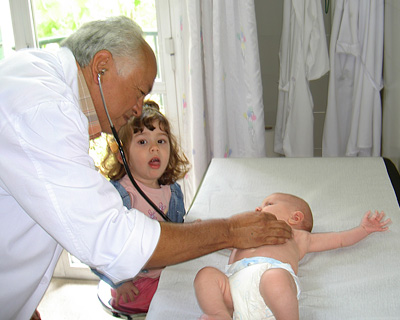First symptoms and early Pectus detection

The paediatrician is normally the first professional that people consult about this thoracic malformation. Therefore, he/she must in this first consult make a correct medical history, inform properly the parents about the present problem and its future possibilities and, be aware of where and to whom send the patient for a resolution of the problem.
The medical history must include the familiar records of this deformity, personal records of broncho-pulmonary and cardiological upsets and, a routine exploration of the child.
If the patient is less than six years old and is asymptomatic, it is not necessary to make complementary tests or to send to surgery. It is enough to make an annual control and to check whether the defect is progressive or not. In the case of a growing defect or beginning of symptoms, what is not much frequent at that age, the child must be sent to a surgeon for an objective evaluation.
At the same time, the paediatrician must give psychological support and practical counselling to the family as it have been proved that the parental attitude towards the illnesses or anomalies of their children is fundamental for the acceptance or rejection of the patients towards their disease. This happens frequently with boys and girls that suffer from pectus excavatum.
The parents that achieve that their children accept the deformity as a constitutive part of their body are normally those who create, together with their children, strategies for overcoming the anxiety and sense of inferiority so common in these patients. It is important for the children to grow up feeling equal to their friends and partners.
However, as regards severe deformities, parents must be aware of it, and their advice and psychological support must go towards a resolution, normally surgical and in due course of the malformation. The patient must recognize his/her pathology and must be prepared for the restorative intervention as well as for the posterior evolution.
Paediatricians must be capable of detect the attitude of the parents towards the deformity and guide them properly so the accept and face the appropriate decision. Moreover they must know how to offer psychological support as much to parents as to patients.

